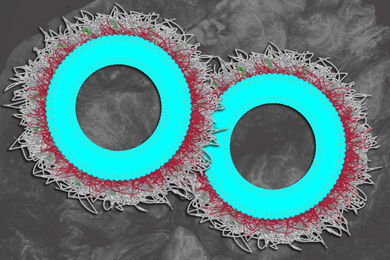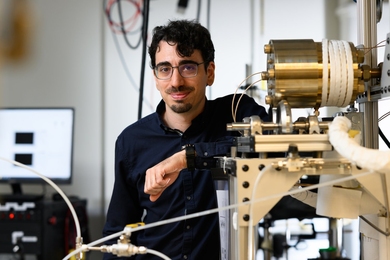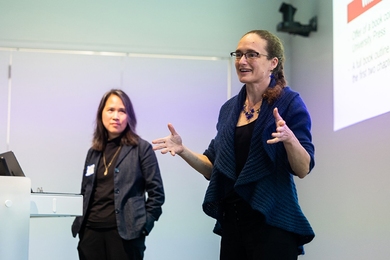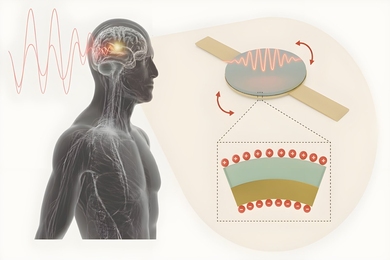Philip G. Freelon MArch ’77, professor of the practice in the MIT Department of Architecture, lead architect for the Smithsonian’s National Museum of African American History and Culture, and a dedicated force for inclusivity within the field of architecture, died on July 9 in Durham, North Carolina, of the neuro-degenerative disease amyotrophic lateral sclerosis (ALS), with which he had been diagnosed in 2016. He was 66.
For nine years beginning in 2007, Freelon taught 4.222 (Professional Practice), a required subject in the master’s in architecture program that uses current examples to illustrate the legal, ethical, and management concepts underlying the practice of architecture.
“Phil was a remarkable architect, a motivating teacher, a spirited public intellectual and above all, an exceptional human being whose modesty and respect of others and their ideas put the best face on the architect and on the profession,” says Hashim Sarkis, dean of MIT’s School of Architecture and Planning (SA+P).
A native of Philadelphia, Freelon attended Hampton University in Virginia before transferring to North Carolina State University, from which he graduated in 1975 with a bachelor of environmental design degree in architecture. He earned his master’s degree in architecture from MIT and at age 25 was the youngest person to pass the Architecture Registration Exam in North Carolina.
The Freelon Group, which he founded in 1990, became one of the largest African American-owned architectural firms in the country.
“Phil Freelon was a creative and productive alumnus of the MIT School of Architecture and Planning,” says Adèle Naudé Santos, SA+P dean when Freelon joined the faculty. “His buildings are beautifully crafted and spatially inventive, and we were proud to have him on our faculty. We are greatly saddened by his passing.”
Freelon headed multifaceted design teams for museum projects and cultural institutions such as the Museum of the African Diaspora in San Francisco, the Reginald F. Lewis Museum of Maryland African American History and Culture in Baltimore, the National Center for Civil and Human Rights in Atlanta, the Harvey B. Gantt Center for African-American Arts and Culture in Charlotte, Emancipation Park in Houston, and the Anacostia and Tenleytown branches of the District of Columbia Public Library System.
The practice joined with three other design firms as Freelon Adjaye Bond/SmithGroup to create the Smithsonian National Museum of African American History and Culture. As lead architect and architect of record for the project, on which David Adjaye was lead designer, Freelon directed the programming and planning effort that set the stage for the museum’s design.
In 2014, The Freelon Group joined global design firm Perkins and Will. Recent and current projects led by Freelon include North Carolina Freedom Park in Raleigh, the Durham County Human Services Complex, the Durham Transportation Center, and the Motown Museum Expansion in Detroit. He was appointed to the board of directors and the executive committee of Perkins and Will while serving dual roles as managing director and design director of the firm’s North Carolina practice.
In addition to his role at MIT, he was an adjunct faculty member at North Carolina State University’s College of Design and lectured at Harvard University (where he was a Loeb Fellow), the University of Maryland, Syracuse University, Auburn University, the University of Utah, the University of California at Berkeley, Kent State University, and the New Jersey Institute of Technology, among others. A Peer Professional for the GSA’s Design Excellence Program, he also served on numerous design award juries including the National AIA Institute Honor Awards jury and the National Endowment for the Arts Design Stewardship Panel.
“Phil was one of the hardest working people I ever knew,” said Lawrence Sass, associate professor in the Department of Architecture at MIT and director of the computation group. “I could not believe that someone so humble could have done so much. He was a dedicated professor in addition to being a trusted design professional, and a leader who lived in the spirit of a design giant. He taught from real-world experience. He was emotionally and professionally accessible. I will forever miss and remember his larger-than-life presence walking down the Infinite Corridor.”
Freelon was a Fellow of the American Institute of Architects, and the recipient of the AIA North Carolina’s Gold Medal, its highest individual honor. A LEED Accredited Professional, he was the 2009 recipient of the AIA Thomas Jefferson Award for Public Architecture, and in 2011 was appointed by President Obama to the U.S. Commission of Fine Arts. The Freelon Group received 26 AIA design awards (regional, state, and local) and received AIA North Carolina’s Outstanding Firm Award (2001). Freelon’s furniture design received first prize in the PPG Furniture Design Competition, and he did design contract work with Herman Miller.
His work has appeared in national professional publications including Architecture, Progressive Architecture, Architectural Record, and Contract magazine (Designer of the Year, 2008), and his and the firm’s work has been featured in Metropolis and Metropolitan Home magazines and the The New York Times.
Freelon is survived by his wife of 40 years, Nnenna Freelon; his children Deen, Maya, and Pierce; three siblings; and six grandchildren. A celebration of his life will be held on Sept. 28 at the Durham County Human Services Complex in Durham. In lieu of flowers, donations can be made to NorthStar Church of the Arts, a nonprofit art and culture center founded by Nnenna and Phil Freelon.






